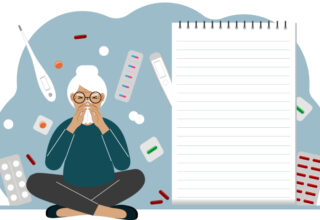We all have heard that eating well is good for our body. But have you ever thought about how your diet affects your mental health?
Research shows that the food we eat can affect our mood, energy, focus, and even our risk of mental health conditions like anxiety and depression.
Let’s take a closer look at how diet and mental health are linked, which foods can give your mental health a boost, and some simple lifestyle habits that can support your mental well-being.
How are Diet and Mental Health Connected?
Our brain is working all the time and it needs “fuel” to do that work—which comes from what we eat. For proper functioning, our brain needs a steady supply of nutrients like healthy fats, amino acids, and vitamins.
When we don’t get enough of these nutrients, our brain chemistry gets disrupted—which can affect our mood, concentration, and ability to cope with stress.
The relationship between food and mental health is complex. Here are a few key ways in which our diet affects our mental health:
Blood Sugar Balance:
When we don’t eat regularly, our blood sugar levels drop, which makes us feel anxious and disoriented. If you’ve ever felt shaky, irritable, or low after skipping a meal, that’s your blood sugar dipping.
On the other hand, too much sugary or processed foods can cause spikes and crashes in your blood sugar levels leaving you feeling tired, irritable, and anxious.
Healthy Fats:
Omega-3 fatty acids (found in oily fish, walnuts, and flaxseeds) are essential for building brain cells and reducing inflammation. Research suggests that these healthy fats may lower the risk of depression and improve overall brain function.
Gut Health:
Our digestive system and brain are in constant communication through the “gut-brain axis”. A diet rich in fiber helps feed the “good bacteria” in your gut, which in turn supports mood regulating chemicals like serotonin.
Here are 7 foods to boost serotonin levels naturally.
Micronutrients:
Vitamins and minerals like B vitamins, magnesium, zinc, and iron, all play a role in production of neurotransmitters—the brain’s chemical messengers. A diet lacking these micronutrients can cause low mood and fatigue.
What Should You Eat to Support Mental Well-Being
The good news is you don’t have to change your entire diet all at once. Small and consistent changes can make a big difference.
Here’s what you can do:
- Eat regular meals to keep your energy levels and mood stable
- Drink plenty of water, even mild dehydration can cause tiredness and slow you down mentally.
- Add whole foods like fruits, vegetables, whole grains, legumes, nuts, and seeds in your diet. They provide fiber and nutrients your brain needs to work properly.
- Include protein in each meal. Foods rich in protein like eggs, poultry, beans or lentils supply amino acids. Your brain uses these amino acids as building blocks for neurotransmitter and protein synthesis.
- Choose healthy fats. They can be found in olive oil, avocados, nuts, seeds, and oily fish. They help support brain function and structure.
- Watch your caffeine intake. Too much caffeine can mess with your sleep and trigger anxiety.
- Opt for traditional diets like the Mediterranean or Nordic diets that are rich in plants, legumes, fish, and whole grains. These diets have been linked to lower the risk of depression.
- Cut back on ultra-processed foods, sugary snacks, and refined carbohydrates. They have been linked with higher risk of anxiety and depression.
The Social Side of Food
Food isn’t just about nutrients—eating is also a social and emotional activity. Sharing a meal with your family, friends, or colleagues can strengthen your connection with them and reduce feelings of loneliness. This helps improve your mental well-being.
Try to take some time at least once a week to share a meal with others—no T.V, no mobile phones, just food and conversation.
Other Ways to Support Mental Health
While diet plays an important role, it’s not the only factor that affects your mental health.
There are other things that matter too, like:
- Regular physical activity—exercise releases endorphins and helps reduce stress
- Spending some time in nature, even a short walk daily in nature can help improve your mood and focus
- Good sleep hygiene—quality sleep is important for both your physical and mental health
- Avoiding smoking and alcohol, as both can negatively affect mental health
Final Thoughts
A healthy diet doesn’t magically cure mental health problems, but it can make a big difference in how you feel day to day. A healthy diet doesn’t just support your physical health but also helps improve your mood, focus, and ability to cope with stress.
Think of food as a part of your mental health toolkit—alongside other things like exercise, social support, rest, and professional help when you need it.








